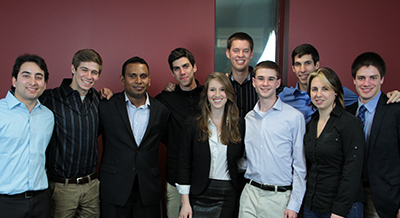Student Ambassadors Sean Maroni, Lucas Arzola, Blake Margraff and Jared Karp have founded a startup, BetaVersity, to build innovation ecosystems at universities across the country.

by Tim Huntley
This article, BetaVersity: Taking Innovation to School, was first published at An Entrepreneurial Life and is used with permission.
The benefits of a college degree, a higher paying job and upward mobility, have been a long standing assumption for college students, but the ability to realize those benefits have diminished in recent years. A study by the Pew Research Center and reported by Time points to the primary problem: “Only 54.3% of young adults aged 18 to 24 have a job.” This is the lowest rate since 1948 when these statistics began being collected. Layered on top of this is the grim news that total student debt now exceeds one trillion dollars.
According to Enrique J. Lavernia, Dean of the College of Engineering at UC Davis, “Universities across the nation face unique challenges in balancing the outcomes of their complex curriculum – stimulating student engagement, integrating real-world experience, and incorporating opportunities for innovation – while delivering a quality education. Currently, this issue manifests itself in significant dropout rates of approximately 50% of engineering undergraduates, a problem I have made my mission as Dean to resolve.”
Is there a way out? Absolutely – if universities embrace entrepreneurship and innovation.
Creating Space for Innovation
Innovation ecosystems at universities have helped lower student dropout rates, reduce unemployment of recent graduates, boost startup successes, and made college more rewarding and applicable to the real world. While the growth in student created businesses and campus entrepreneurship is encouraging, there is a screaming need more education, more mentoring, and more space.
To help address this need, a team of four entrepreneurs and community builders have assembled their own startup called BetaVersity. Founded by Sean Maroni, Lucas Arzola, Blake Margraff, and Jared Karp, BetaVersity designs and installs prototyping labs, trains student leaders, hosts e-weeks, tweaks university IP policies, and provides support for these entrepreneurial hubs they are creating.

The four BetaVersity founders with a group of their fellow Student Ambassadors: (far left) Lucas Arzola; (back row middle) Jared Karp; (back row, second from right) Jared Karp; and (front row, second from right) Blake Margraff.
In March 2013, the founders of BetaVersity sat down at the 2013 NCIIA Open Conference in Washington D.C., which is an annual conference for entrepreneurship educators. Sean explain how the idea for the business came about:
“We were there as student ambassadors for the Stanford Epicenter, an NSF funded program tasked with increasing undergraduate entrepreneurship opportunities across the country. Late into the night on day two of the conference, the idea for what would become BetaVersity was born. We realized we’ve been on the front lines of the recent popularization of entrepreneurship, and we’ve seen both the right and the wrong way to go about it. After the conference, we went back to our campuses, did all the things you do on day one of a new business, and on day 29 we signed our first customer for a 600 square foot BetaSpace at UC Davis.”

Their first customer, UC Davis, has been supremely active in ensuring BetaVersity gets off the ground, but the engagement with UC Davis is only the beginning. And the BetaVersity team is in an enviable situation of funding purely off revenues and founder investment.
Sean added, “In time, we plan to grow our consulting business and expand into tech products intended to network these innovation ecosystems together. When that time comes we may consider alternative financing options.”
With 4,500 academic, degree-granting institutions in the United States, the market opportunity for BetaVersity products and services is promising.
To learn more, please visit the BetaVersity website or connect with them on Twitter.


